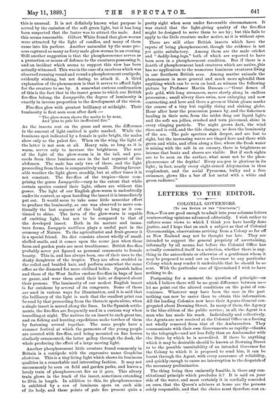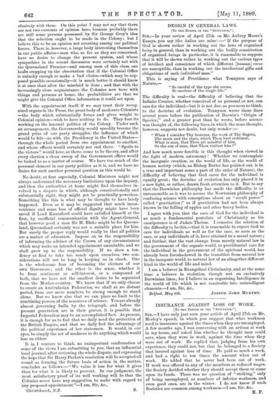LETTERS TO TILE EDITOR.
COLONIAL GOVERNORS. rro THE EDITOR OF THE "SPECTATOR,")
Sia,—You are good enough to admit into your columns letters controverting opinions advanced editorially. I wish rather to enforce some views to which I think you have hardly done justice, and I hope that on such a subject as that of Colonial Governorships, observations arriving from a Colony so far off as New Zealand may not be thought too late. They are intended to support the general propriety of ascertaining, informally by all means, but before the Colonial Office has actually committed itself to a selection, whether there is any- thing in the antecedents or otherwise of a gentleman whom it may be proposed to send out as Governor to any particular Colony which may render it undesirable that he should be so sent. With the particular case of Queensland I wish to have nothing to do.
Postponing for a moment the question of principle—on which I believe there will be no great difference between us— let me point out the altered conditions on the point of con- venience. Whatever may have been the case in the past nothing can now be easier than to obtain this information. All the leading Colonies now have their Agents-General con- gregated about Downing Street. In many of them, the Agency is the blue-ribbon of the public service ; in all, the Agent is a man who has made his mark. Individually and collectively, the Agents are now received at the Colonial Office on a footing not wholly removed from that of the Ambassadors. They communicate with their own Governments as rapidly—thanks to the telegraph—and not less fully than an Ambassador with the State by which he is accredited. If there be anything which it may be desirable should be known at Downing Street, as to the possible unsuitability of an intended Governor for the Colony to which it is proposed to send him, it can be learnt through the Agent, with every assurance of reliability, and quickly enough to cause no interruption to the despatch of the necessary preliminaries.
The thing being thus eminently feasible, is there any con- stitutional principle which precludes it ? It is said on your side of the water, and most certainly it is cordially conceded on ours, that the Queen's advisers at home are the persons solely responsible, and that the choice must therefore rest ex- -
elusively with them. On this point I may not say that there are not two currents of opinion Isere, because probably there are still some persons possessed by Sir George Grey's idea that the selection ought to be made in the Colony ; but I believe this to be an opinion not counting among our political forces. There is, however, a large body interesting themselves in our public affairs—men who, so far as they are concerned, have no desire to change the present system, and whose sympathies in the recent discussion were certainly not with the Queensland Premier—and among men of this class, one heals cropping up the observation that if the Colonial Office is unlucky enough to make a bad choice—which may be sup- posed possible occasionally—it is much better it should know it at once than after the mischief is done ; and that with the increasingly close acquaintance the Colonies now have with things and persons at home, the probabilities are that we might give the Colonial Office information it could act upon.
With the appointment itself, if we may trust their recog- nised organs in the Press, the great body of moderate Colonists —the body which substantially forms and gives weight to Colonial opinion—wish to have nothing to do. They fear its working on the internal politics of the Colony. Under such an arrangement, the Governorship would speedily become the grand prize of our party struggles, the influence of which would be felt—as with the Presidency in the United States— through the whole period from one appointment to another, and whose effects would certainly not end there. "Spoils to the victors" would here, as there, come to be the cry, and after every election a clean sweep of the Government offices would be looked to as a matter of course. We have too much of the personal element in our party politics as it is, and we have no desire for such another personal question as this would be.
No doubt, at first especially, Colonial Ministers might not always understand the necessary limitations upon the inquiry, and then the authorities at home might find themselves in- volved in a dispute in which, although constitutionally and substantially right, they might yet be practically powerless. Something like this is what may be thought to have lately happened. Even so it may be suggested that much incon- venience and some loss of official dignity might have been saved if Lord Knutsford could have satisfied himself at the first, by unofficial communication with the Agent-General, that however good a man Sir H. Blake might be for Queens- land, Queensland certainly was not a suitable place for him. But surely the proper reply would really be that all politics are a matter of education. Impose on us the responsibility of informing the adviser of the Crown of any circumstances which may make an intended appointment unsuitable, and we shall grow up to the responsibility. If we show a ten- dency at first to take too much upon ourselves, two con- siderations will not be long in keeping US in check. One is the wholesome fear of becoming the electors of our own Governors ; and the other is the sense, whether it be from sentiment or self-interest, or a compound of both, that we have not the smallest desire to be separated from the Mother-country. We know that if we only choose to create an Australasian Federation, we shall at no distant period, from our mere numbers, be strong enough to stand alone. But we know also that we can place no limit to the combining powers of the resources of science. You are already almost governing India by the telegraph, and before the present generation are in their graves, it is possible that Imperial Federation may be an accomplished fact. At present, it is enough for us to feel that we daily need the protection of the British Empire, and that we daily feel the advantage of the political experience of her statesmen. It would, in our eyes, be simply the act of madness to do anything which would lose us either.
It is, I venture to think, no unimportant confirmation of some of the views I am submitting to you, that an influential local journal, after reviewing the whole dispute, and expressing the hope that Sir Harry Parkes's resolution will be accepted all round as forming the future basis of action in the matter, concludes as follows :—" We value it less for what it gives than for what it is likely to prevent. In our judgment, the most satisfactory proof of its well working will be that the Colonies never have any suggestion to make with regard to any proposed appointment."—I am, Sir, &c., Christchurch, N.Z. S.







































 Previous page
Previous page